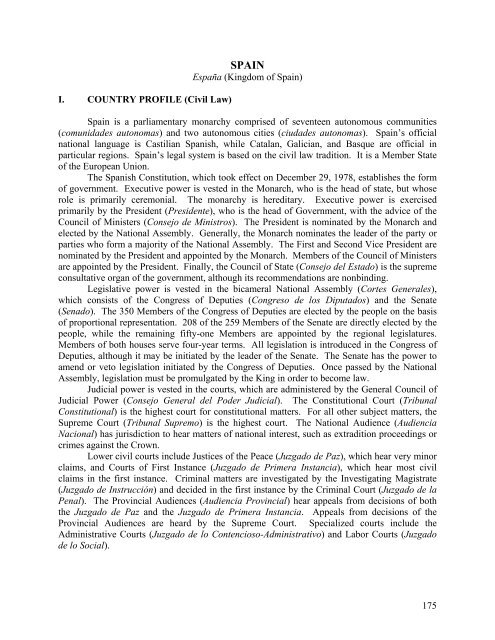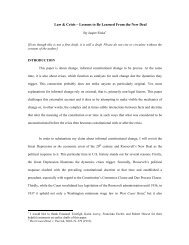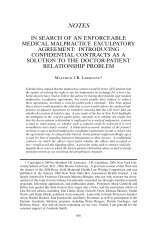Guide to Foreign and International Legal Citations - New York ...
Guide to Foreign and International Legal Citations - New York ...
Guide to Foreign and International Legal Citations - New York ...
Create successful ePaper yourself
Turn your PDF publications into a flip-book with our unique Google optimized e-Paper software.
I. COUNTRY PROFILE (Civil Law)<br />
SPAIN<br />
España (Kingdom of Spain)<br />
Spain is a parliamentary monarchy comprised of seventeen au<strong>to</strong>nomous communities<br />
(comunidades au<strong>to</strong>nomas) <strong>and</strong> two au<strong>to</strong>nomous cities (ciudades au<strong>to</strong>nomas). Spain’s official<br />
national language is Castilian Spanish, while Catalan, Galician, <strong>and</strong> Basque are official in<br />
particular regions. Spain’s legal system is based on the civil law tradition. It is a Member State<br />
of the European Union.<br />
The Spanish Constitution, which <strong>to</strong>ok effect on December 29, 1978, establishes the form<br />
of government. Executive power is vested in the Monarch, who is the head of state, but whose<br />
role is primarily ceremonial. The monarchy is hereditary. Executive power is exercised<br />
primarily by the President (Presidente), who is the head of Government, with the advice of the<br />
Council of Ministers (Consejo de Ministros). The President is nominated by the Monarch <strong>and</strong><br />
elected by the National Assembly. Generally, the Monarch nominates the leader of the party or<br />
parties who form a majority of the National Assembly. The First <strong>and</strong> Second Vice President are<br />
nominated by the President <strong>and</strong> appointed by the Monarch. Members of the Council of Ministers<br />
are appointed by the President. Finally, the Council of State (Consejo del Estado) is the supreme<br />
consultative organ of the government, although its recommendations are nonbinding.<br />
Legislative power is vested in the bicameral National Assembly (Cortes Generales),<br />
which consists of the Congress of Deputies (Congreso de los Diputados) <strong>and</strong> the Senate<br />
(Senado). The 350 Members of the Congress of Deputies are elected by the people on the basis<br />
of proportional representation. 208 of the 259 Members of the Senate are directly elected by the<br />
people, while the remaining fifty-one Members are appointed by the regional legislatures.<br />
Members of both houses serve four-year terms. All legislation is introduced in the Congress of<br />
Deputies, although it may be initiated by the leader of the Senate. The Senate has the power <strong>to</strong><br />
amend or ve<strong>to</strong> legislation initiated by the Congress of Deputies. Once passed by the National<br />
Assembly, legislation must be promulgated by the King in order <strong>to</strong> become law.<br />
Judicial power is vested in the courts, which are administered by the General Council of<br />
Judicial Power (Consejo General del Poder Judicial). The Constitutional Court (Tribunal<br />
Constitutional) is the highest court for constitutional matters. For all other subject matters, the<br />
Supreme Court (Tribunal Supremo) is the highest court. The National Audience (Audiencia<br />
Nacional) has jurisdiction <strong>to</strong> hear matters of national interest, such as extradition proceedings or<br />
crimes against the Crown.<br />
Lower civil courts include Justices of the Peace (Juzgado de Paz), which hear very minor<br />
claims, <strong>and</strong> Courts of First Instance (Juzgado de Primera Instancia), which hear most civil<br />
claims in the first instance. Criminal matters are investigated by the Investigating Magistrate<br />
(Juzgado de Instrucción) <strong>and</strong> decided in the first instance by the Criminal Court (Juzgado de la<br />
Penal). The Provincial Audiences (Audiencia Provincial) hear appeals from decisions of both<br />
the Juzgado de Paz <strong>and</strong> the Juzgado de Primera Instancia. Appeals from decisions of the<br />
Provincial Audiences are heard by the Supreme Court. Specialized courts include the<br />
Administrative Courts (Juzgado de lo Contencioso-Administrativo) <strong>and</strong> Labor Courts (Juzgado<br />
de lo Social).<br />
175
















